|
|
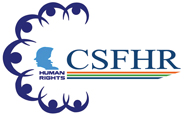 |
Civil Society Forum on Human Rights |
| CSFHR e-Newsletter |
| VOLUME- I ISSUE- 3 MARCH 2015 |
|
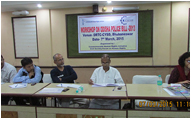 |
|
|
|
| |
|
| |
Dear Readers,
We are pleased to bring out the second edition of CSFHR’s electronic newsletter. This edition will familiarize you with the regular features and activities of CSFHR during the last month.
Friends, the Odisha Police Bill - 2015 already is tabled in the Odisha Legislative Assembly in March Session. The bill is not in conformity with the Supreme Court's directives, and there are other concerns of non conformity with legal standards and excessive powers given to the police. In this regard CSFHR presented a memorandum to the honourable Governor of Odisha requesting him to review the Odisha Police Bill 2015 and take appropriate action for seeking public opinion through wider debates and consultation on the Bill. CSFHR also organised public debates, discussions with the civil society demanding the withdrawal of the bill and to jointly start initiatives to modify the bill with several recommendations.
CSFHR also welcomes the recent Supreme Court order of scrapping of section 66 (A) of the IT Act. The order notes that Section 66A violates an article of the Indian constitution that guarantees freedom of speech and expression. This judgement is definitely a win for freedom of speech and expression.
We wish our readers a happy reading!
CSFHR Team |
| |
|
| |
|
| |
11,000 schools have no kitchens to cook MDM
About 11,000 of 62,640 schools in the state with mid-day meal (MDM) programme have no kitchens to cook food for the children. Replying to a written question of legislator Chandra Sekhar Majhi, the school and mass education Minister Debi Prasad Mishra pointed out, “Of the total 62,640 MDM- implemented schools, 10,930 schools do not have kitchens.” Mishra said, “Rs 17,410.8 lakh was sanctioned to all the districts for construction of MDM kitchen sheds in these schools and officials have been asked to expedite the process,” the minister said.
See more
117 cases of minor motherhood in Odisha till now: State Government yet to take any steps to prevent such crimes
As per the reports presented in the State Assembly by Minister for SC and ST Development Lalbihari Himirika, there have been 117 minor motherhood cases in the state till date. While the incidents of minor motherhood in Malkangiri, Koraput and Kandhamal districts of Odisha has triggered state-wide uproar, another such incident has come to the limelight in Bolangir district. The issue was cropped up during demand discussion of ST and SC Development, Minorities and Backward Classes Welfare department in the State Assembly on Thursday where chief whip of Opposition Congress Tara Prasad Bahinipati came down heavily on the state government for its failure in containing minor motherhood cases in tribal schools.
In a similar incident, one tribal minor girl reading in class VIII at Kandulbeda Tribal Welfare School under Boipariguda block in Koraput District became mother. The girl complained severe abdominal pain on 5th March. The school authorities kept silent without informing to their higher authorities and admitted her in Boipariguda Community Health Centre, from where she was later shifted to a hospital at Jeypore.
See more
Child Care Home Pushes Minor to Forced Labour
BHUBANESWAR: In a bizarre incident, a child care institution (CCI) of Khurda, which was asked to shelter a distressed minor boy, ended up employing him in a grocery shop in gross violation of child rights norms. Though the Khurda Child Welfare Committee (CWC) ordered legal actions against the shelter home and transfer of all its inmates to another CCI, the district administration is yet to initiate any measure. The 13-year-old boy, who belongs to Sambalpur, was studying in Buxi Jagabandhu Bidyadhar High School of Khurda and was deserted by his mother. He was left at Bhairabi Club Open Shelter last year.
See more
14 workers from Odisha released from bonded labour
Fourteen workers from Odisha, including women and children and belonging to three families, were released from bonded labour at Kokkirapalli near Elamanchili following a raid by Revenue Divisional Officer of Anakapalle and the police, on Friday. Following the intervention of former Union Secretary E.A.S. Sarma and complaints received by the NHRC and the International Justice Mission, Collector N. Yuvaraj directed RDO Padmavathi to investigate and get the workers released. “She along with local tehsildar and a Sub-Inspector went in search of the brick kiln in private vehicles and found them engaged as bonded labourers,” Mr. Yuvaraj said. The labourers — five men, six women, and three children — are from Karla in Bolangir district of Odisha. A compensation of Rs. 1.5 lakh was handed over to them. They were given tickets and put in train to their village. A constable was accompanying them.
See more
Ostracised by family for eating at Dalit home, old Odisha man dies
Abandoned by his family and ostracised by the community for nothing more than sharing a meal with a Dalit family, Laxman Bagarti from Rajing village under Puruna Cuttack panchayat in Harabhanga block in Boudh district died at the district headquarters hospital here on Friday. So grave was the ‘sin’ of this old man that his family did not relent even after he died. His four grown up sons neither visited him at the hospital while he was being treated nor cremated his body after his death. After waiting till 2 PM on the same day, the district administration made arrangements for his funeral. NAC employees in the presence of the tehsildar and police buried the body of Laxman at the graveyard. A few years back, Laxman had asked his wife for food on reaching home from his fields. For some reason, the couple ended up in a quarrel. Laxman in a fit of anger threatened to take food at a Dalit’s place, which he did. Since then Laxman was ostracized by his family and his community.
See more
Rape cases on the rise in Odisha
Chief Minister Naveen Patnaik today claimed in the Odisha Assembly that the overall crime situation remained under control during 2014, but a white paper tabled by Home Department told a disturbing story about rising number of rape case cases in the State. As many as 2,011 rape cases were registered by the State police in 2014, against 1,832 rape cases in 2013 and 1,458 rape cases in 2012.
A total of 271 rape cases have been registered this year so far, according to the white paper tabled in the State Assembly.
See more
|
| NHRIs/SHRIs in News |
| |
Bhadrak Collector Seeks Apology from NHRC
The District Magistrate and Collector of Bhadrak, LN Mishra has sought apology from the National Human Rights Commission (NHRC) for the alleged negligence of the administration in submitting reports as sought by the Commission regarding starvation death of three members of a family. As per reports, Sridhar Mishra (35) of Jagannathprasad village of Bhandaripokhari block in Bhadrak district had allegedly died of starvation on February 21, 2013. Human rights activist Radhakanta Tripathy filed a petition in NHRC seeking food and medical security to his old parents. Acting on the petition, the NHRC sought a report from the Collector.
See more
NHRC’s blow to Odisha on liquor tragedy damage
National Human Rights Commission (NHRC) has directed the state government to pay compensation to next of kin of 40 people, who died after consuming contaminated medicinal preparations containing alcohol in villages of Cuttack and Khurda districts in February 2012. The NHRC direction came in accordance to the recommendations made by a judicial commission of enquiry headed by retired High Court Judge Justice A S Naidu. The commission had suggested in its report that an amount of Rs 1.5 lakh each be paid as damage to the families of 40 deceased although, 41 people had died in the tragedy. The commission was not inclined to pay damage to one deceased as he was one of the illicit vendors of the liquor. Although, the state government accepted the report of the Judicial Commission, it decided not to pay compensation to the families of the victims as suggested by the Commission.
See more
OHRC Asks Government to Pay Aid to Student's Kin
The Odisha Human Rights Commission (OHRC) has directed the State Government to pay Rs 2 lakh as compensation to parents of a 12-year-old girl who had died after a wall of an under-construction school toilet collapsed on her in Ganjam district in October last year. The bench comprising acting Chairperson Justice BK Mishra and member BK Patnaik instructed Secretary, School and Mass Education Department to comply with the order within six weeks. Rights activist Prabir Kumar Das had filed a petition drawing attention of the Commission to the negligence of authorities which cost the life of Tilottama Patra, a Class VI student of Nimakhandipetha Upper Primary School under Digapanhandi block of Ganjam
See more
Rights panel asks Odisha for report on mid-day meal
Odisha Human Rights Commission (OHRC) has directed the State government to submit a report on repeated incidences of contaminated food served to students under Mid Day Meal scheme. OHRC issued the direction acting on a complaint lodged by human rights activists Biswapriya Kanungo and Bijay Kumar Panda, who alleged that the implementation of MDM scheme was pathetic. “MDM scheme, an important step towards stopping dropouts and addressing malnourishment, has become a mess in the State.
See more
NHRC asks OHRC to act over jaundice
The National Human Rights Commission (NHRC) has asked the Odisha Human Rights Commission (OHRC) to act over the large scale outbreak of jaundice in the State. The NHRC passed the order on a petition filed by activist Radhakanta Tripathy. The petitioner stated that by the end of January, the death toll due to jaundice in Sambalpur town has reached 17 while a filthy drainage system and damaged water supply pipelines are being blamed for the spread of the disease in the town that has a population of nearly 2 lakhs.
See more |
| Important Judgements/ Orders/ Observations |
| |
Supreme Court scraps Section 66A of IT Act
In a historic verdict related to the freedom of speech on the Internet, the Supreme Court on Tuesday scrapped Section 66A of the Information Technology Act, terming it as unconstitutional.
Justices J Chelameswar and Rohinton F Nariman passing the judgement said that 66A the court cannot go by the government’s assurances that the section will not be misused as that cannot be properly implemented because governments come and go.
See more
Give free treatment to acid attack victims: Apex court
The Supreme Court on Friday asked all private hospitals across the country to provide free treatment, including medicines and corrective surgeries, to acid attack victims. The Social Justice Bench of Justices Madan B Lokur and Uday U Lalit asked all state governments and Union Territories to immediately take up the matter with the private hospitals to ensure that acid attack victims are attended to immediately and adequately.
See more
|
|
| |
NHRC’s direction to the Jharkhand Government to provide immediate compensation to the boy injured in Police Firing.
In response to the complaint filed with the NHRC by Advocate Chandranath Dani on the matter of Juvenile (Gautam Mahto) of village Mathu, Ranchi , Jharkhand, being injured by Police Firing, the Commission has directed the state government to provide immediate monetary relief to the victims family. The incident has occurred on 2.12.2013, wherein a three years old child belonging to the extremely poor family has sustained bullet injuries from firing range of Jharkhand State Police.
Despite lapse of considerable time, no relief has been granted to the victim by the State Government. The Deputy Commissioner, Ranchi was categorically directed by the Commission to provide Monetary Relief or other help as can possibly be provided to the victim and his family under poverty alleviations and Social Welfare Schemes of the Centre and State meant for poor / below poverty line people. The Deputy Commissioner, Ranchi has not taken any steps in this regard. The aforesaid conduct on the part of Deputy Commissioner, Ranchi amounts to violation of Human Rights of the victim and his family. A notice has been sent under section 18 of the Protection of Human Rights Act 1993, the Government of Jharkhand through its Chief Secretary, to show cause as to why an amount of Rs.50, 000/- (Rupees Fifty Thousand) be not recommended to be paid to the victim within six weeks. The Chief Secretary, Government of Jharkhand is also directed to initiate an appropriate enquiry against the Deputy Commissioner, Ranchi for inaction in the matter and to submit the Action Taken Report within this period.
NHRC recommended that interim relief of monetary compensation of Rs.25, 000/- to the boy assaulted by Police personnel
The National Human Rights Commission after receiving a complaint dated 17.07.2012 from Chandranath Dani alleging that a boy Sadananda Barik of village, Garvana, block & ps. sohela,Bargarh aged 17 years who was brutally assaulted by the police personnel and sustained injuries. The victim boy was hospitalized and an amount of Rs.10, 000/- was paid for his treatment from Red Cross funds. The Commission in its detailed Proceedings dated 25.10.2013 had held that there was violation of human rights of the victim boy. The Commission had issued Notice dated 14.11.2013 to Chief Secretary, Govt. of Odisha to show cause, why Suitable relief of monetary compensation shall not be granted to the victim as per Section 18 of the Protection of Human Rights Act, 1993.
The victim’s father alleged that due to torture of Police, his son has sustained a severe mental shock and developed psychiatric disorders and no action was taken against delinquent police personnel. Police Authorities did not submit any report in the matter until report dated 16.12.2013 of Superintendent of Police, Bargarh, which apparently was after more than 17 months from date of alleged incident. The Police Authorities have also admitted that there was alleged incident of threatening/ intimidation to victim boy by the police personnel. The enquiry conducted by Child Welfare Committee and Report dated 27.12.2012 of Collector, Bargarh, Odisha had specifically stated that there was fault on part of police personnel in the alleged incident. Further the grant of funds from Red Cross funds for medical treatment itself indicates that the victim boy sustained injuries in the alleged incident. Having perused the documents placed before it, the Commission is of the opinion that there was gross violation of human rights of victim boy. He has been advised to continue medical treatment for longer period. The commission has taken a serious note of such human rights violation at the hands of police personnel. The Commission recommends that interim relief of monetary compensation of Rs.25, 000/- (Twenty Five thousand) shall be granted to the victim boy by the State of Odisha under Section 18 of the Protection of Human Rights Act, 1993. Chief Secretary, Govt. of Odisha shall submit his Compliance Report along with proof of payment. Response within four weeks. Director General of Police, Odisha is directed to get a fresh enquiry conducted in the matter from a Gazetted Police Officer of CB/CID. Appropriate action be taken against delinquent police officers.
NHRC sought report from the Police DG
A TV journalist in Bargarh who tried to cover the news of goons who forcefully extract money from the local shopkeepers every week was threatened by the chairman of the Municipal Office not to cover the news. He even threatened to kill him and broke his camera. The Bargarh police was silent on this issue.
Human Right Activists, Akhand filed a case at National Human Right Commission, in this connection on 06.03.2015. The NHRC has asked the DG of police to submit a report within four weeks. It may be noted that Bargarh is the same district where few month back, the Police was involved in the act of unlawful searching a journalist’s house without a search warrant.
|
| |
|
| |
| Workshop on Right to Freedom of Expression |
| |
The Supreme Court’s recent judgment for scrapping of Section 66 A of the Information Technology Act for being “unconstitutional in entirety” is indeed a joyous moment for the democracy and set ethos for right or freedom to express and opine. In this context a one day workshop was organized by CSFHR and Report on Reporters (RoR) on the Freedom of Speech and Expression on 7th April 2015 at CYSD, Bhubaneswar in which 35 participants from media and development sector participated. Prof. Surya Mishra, KIIT University, Jatindra Das, Senior Journalist, Kedar Mishra, Progressive Journalist, Writer and Poet, Priya Ranjan Sahu, Senior Journalist and Basudev Mohapatra, Senior Journalist joined as the panellists in the workshop. The panellists gave their presentations followed by question answer session and open house discussion.
An open house discussion was also conducted in the second half of the day which was chaired by Mr. Bagambar Pattnaik, Mr. Akhand, Mr.Sankar Pani and Mr.Gadadhar Pradhan.
Adv. Chandranath Dani discussed with the participants on how to go forward with the work of strengthening the right to freedom of speech and expression. A number of suggestions came and noted down to carry forward the work.
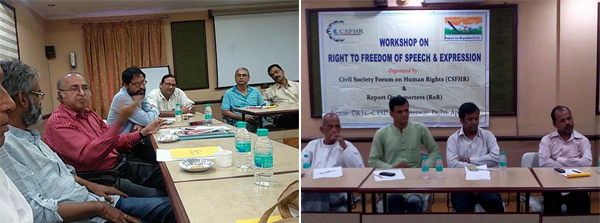
|
| |
| Annual Convention of Civil Society Forum on Human Rights (CSFHR) |
| |
Civil Society Forum on Human Rights (CSFHR) has been creating awareness and capacity building programmes on human rights and has been able to create 250 community level human rights defenders, who in turn have succeeded in taking up causes of thousands of victims of human rights violations. In continuation of its efforts, CSFHR organized its Third Annual Convention from 20th – 21stMarch, 2015 at Red Cross Bhawan, Bhubaneswar.
The honourable guests present were Mr. Justice B.K Misra, Acting Chairperson OSHRC, Mr. A. K. Parashar, NHRC Focal Point on HRDs, Ms. Kasturi Mohapatra, Chairperson OSCPWD, Ms. Sujata Jena, Advocate Odisha High Court and Governing Body Member CSNR and Mr. Henri Tiphagne, Chairperson Forum Asia.
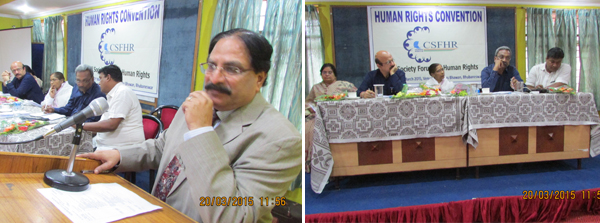
The main highlights of the Convention were: analysing the Human Right situation in the State, major challenges before Human Rights Defenders in monitoring Human rights violation, advocacy on the emerging issues at state and national level and work out a common action agenda on intervention of HRV cases. A discussion on the Odisha Police Bill was held with the participants at the grass root level so that they could carry forward the movement of opposing the Bill in their respective regions with greater public debate and consultation.
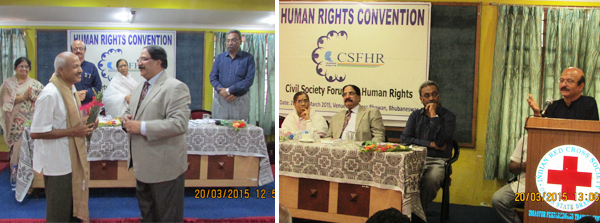
One day Workshop on Odisha Police Bill 2015
On 7th April a one day discussion was held on” Odisha Police Bill, 2015 its critique and recommendations for amendment”, along with other participants, Ms Devika Prasad, from The Commonwealth Human Rights Initiative (CHRI) was present in the discussion. She presented the Odisha Police Bill 2015.
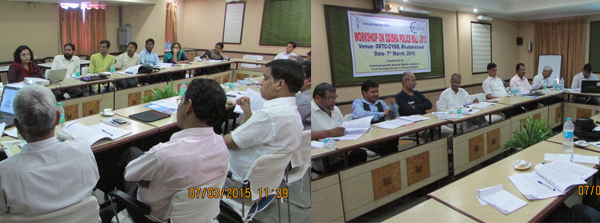
The main objectives of the discussion was to discuss the Odisha Police Bill, 2015 and recommend the inclusion of provisions that will better define police powers and functions, the limits of political control and oversight, and accountability of the police. The suggestions drawn from the meeting were to organize a press meet, reaching the people at the grass root level , conducting public meeting for wider debate and consultation. It was also decided that different articles should be published relating to Odisha Police Bill 2015 in print media.
|
| Articles |
Why civil society is opposing Police Bill in Odisha?
By: Akhand, CSNR/ CSFHR
Odisha Police Bill - 2015 already is tabled in the Odisha Legislative Assembly in March Session. But Civil Society of the state has opposed the bill in the present form. They alleged it is not in conformity with the Supreme Court's directives, and there are concerns of non conformity with accepted human rights standards.
Public Participation: Though the statement of objects and reasons tells, it will have a people's friendly, imperative to good governance, respectful to human rights; there is a need to ensure people's participation in the formulation of the bill. People are the main beneficiaries and also the main victims (if any) of police laws.
But, interestingly, the bill neither took account of questions of transparency & public accountability, nor involved public in making legislation. So the activist demands that Government must make the draft Bill public to call for comments/opinions and must facilitate broad-based consultation with all segments of society, including local governing bodies, with the widest publicity in all newspapers.
The Government should prepare/modify the Bill only after engaging in a sufficient period of consultative processes. Inputs from legal experts, police officials and other concerned sections at levels should be gathered.
State Police Complaints Authority: The SC directed to set up a Police Complaints Authority (PCA) at state level to inquire into public complaints against police officers of and above the rank of Deputy Superintendent of Police in cases of serious misconduct, including custodial death, grievous hurt, or rape in police custody and at district levels to inquire into public complaints against the police personnel below the rank of Deputy Superintendent of Police in cases of serious misconduct.
Clause 50 of the Bill only states that the Police Complaints Authority "shall consist of a Chairperson and three other Members appointed by the Government in the prescribed manner". The Bill departs from the Court's directive and the Model Police Bill (drafted by the Ministry of Home Affairs, Government of India) in significant ways. It only speaks for a state-level Authority. It fails to provide for district-level authorities, which are crucial for reach and accessibility for all parts of the state's population who live away from the capital.
Even in the state-level Authority established, the composition departs from the prescribed models, does not include criteria or a selection process for members, does not provide for independent investigators, and diminishes the weight of its recommendations. All of the legal models and guidance specify that Police Complaints Authorities are to be chaired by retired judges - a retired High Court judge for the state-level Authority and a retired district judge for district Authorities.
The Bill does not indicate who is designated as the Chair, nor does it provide a selection process or criteria. It is also required the Bill must specify complaint procedures and keep provisions for security and protection of rights of complainants. As it goes, the Police officials enjoy arbitrary power under the Police Bill, but there must be adequate provisions of safeguards for the public against any abuse of power by the duty bearers.
The Police complaint authority, under the bill 2015 is more or less a Government nominated body, without having a reasonable scope for enquiring into complaints against Police, in an independent, impartial and fair manner. The Bill must have clear cut provisions to ensure independent, impartial and fair procedures to consider complaints against Police officials. Hence, the Civil Society has suggested that the clause 50 must be entirely deleted and redrafted.
State Security Commission: Clause 30(1) of the Bill requires the state government to establish a State Security Commission within six months of the entry into force of the legislation. The State Security Commission's composition provided for under the Bill does not conform fully to any of the three suggested models of the Supreme Court. The basic purpose of the verdict of apex court in 'Prakash Singh vs Union of India' case for keeping police force independent, impartial and free from Government intervention is deliberately avoided, which is found to be ignored/defeated in present nature and composition of the Security Commission under the Police Bill 2015. The Leader of the Opposition and retired Judge are absent in the Commission. These exclusions immediately remove its non-partisan character. Also, the Commission is dominated by the government officials.
Freedom of Association and Peaceful Assembly: The Police Bill provides that even a Police Officer of the rank of Inspector of Police has power to prohibit the assembly or procession, which is a democratic right of the people, and a fundamental right of freedom, enshrined under article 19 of the Constitution of India. It is clear that the Bill does not place enough controls to prevent arbitrary and unjustified prohibition of public assemblies by the police. Therefore it is recommended that the power given to the police to prohibit a public assembly or procession in public interest in sub-clause 51(3) should be deleted.
Arrest without warrant: Sub-clause 63(2) permits any police officer to take anyone who commits any of listed offences into custody without a warrant. This provision authorises the Police to arrest any person without assigning any reason, and there is no safeguard against misuse of this power of the Police. This provision of the introduced Police Bill is contrary to the law declared by the Supreme Court under article 141 of the Constitution of India and it is also superseding the provision prescribed by the Central Law (CRPC). The activists demanded to delete the sub-clause 63(2).
The Bill may be referred to Select Committee in the Odisha Legislative Assembly involving MLAs of different political parties for collecting public opinions and further revision of the Police Bill 2015.
India - Right to Association Denied by the State Human Rights Commission
Analysis by Mathew Jacob, Director of Programs, People’s Watch, New Delhi.
The Constitution of India through Article 19 ensures fundamental rights of freedom of speech and expression, peaceful assembly, forming associations and unions, moving freely, residing and settling throughout the territory of India and practicing any profession. Article 21 ensures fundamental rights to protection of life and personal liberty and states that no person shall be deprived of his/her life or personal liberty. Going a step ahead, the Supreme Court of India, while hearing the matter Maneka Gandhi vs. Union of India, in 1978, broadened the interpretation of Article 21 and drew inter-connections between Articles 14 (equality before law), 19 and 21.
Thus, a law which prescribes a procedure for depriving a person of ‘personal liberty’ has to fulfil the requirements of Article 14 and 19. According to Justice Krishna Iyer, a pioneer of Indian judiciary, ‘a fundamental right is not an island in itself’. The expression ‘personal liberty’ in Article 21 was interpreted broadly to engulf a variety of rights within itself. The court further observed that the fundamental rights should be interpreted in such a manner so as to expand its reach and ambit rather than to concentrate its meaning and content by judicial construction.
The Tamil Nadu State Human Rights Commission (SHRC), established as per the Protection of Human Rights Act 1993 (PHRA 1993), was envisioned to be an independent, credible, transparent and accountable body that will oversee and monitor the human rights situation and contribute towards new policies for upholding the same and express its commitment to protect and promote human rights. The record of the commission since its establishment has been far from encouraging, if the activists and researchers are to be believed, who have systematically engaged and documented its work. The Commission, in one of the most regressive orders, comprehensively humiliating the spirit of Articles 19 and 21 of the Indian Constitution, the scope of which has been broadened after the Supreme Court ruling in 1978, went to the extremes of banning the use of word ‘human rights’ in organisational titles. In doing so, the Commission grossly violated fundamental rights to peaceful assembly and form associations and unions and, hence curtailed personal liberties. The state legislature, surprisingly complying with the SHRC order, amended the Tamilnadu Societies Registration Act in the year 2010 and enforced this as law.
In a recent matter pending before the Madras High Court relating to the right to association, clearly falling within the definition of the words ‘human rights’ in Sec 2 [d] of the PHRA 1993, the bench sought actions taken by the administration after the SHRC order. It is in response to this and further in response to ‘directions’ from the higher police officers that a series of actions across the state followed- all between 24thFebruary and 7th March 2015, resulting in 142 cases being registered and 33 persons being remanded. In almost all these cases, police themselves are the complainants and where they were successful; they are the village administration officers.
Out of the 142 First Information Reports (FIRs) – the filing of a case a the police station – registered, six of them are against active leaders of Citizens for Human Rights Movement (CHRM), an unregistered platform for advocating for human rights protection and promotion in Tamil Nadu since 2002. One of its active members Mr. Kandasamy was not only arrested but also remanded to judicial custody inspite of specific directions of the Supreme Court in 2014 in the case of Arnesh Kumar vs. State of Bihar. The Supreme Court ordered that there can be no automatic arrest and remand where the offence charged is punishable with imprisonment for a term extending up to seven years. While Mr. Kandasamy was in a hospital, he was kept in a leading chain – thus under physical restraint, completely contrary to other directions of the Supreme Court of India.
The order passed by the SHRC is also in complete contradiction to the directions of the National Human Rights Commission of India (NHRC). NHRC has issued clear directions on this through three circulars between 2009 and 2013 and now a respondent in this pending matter before the Madras High Court has been urged by the ‘human rights’ organisations to support protecting the right to freedom of association.
The unconstitutional order of the SHRC calls for a deep scrutiny of its overt or covert action which has serious implications for the human rights fraternity in the state of Tamil Nadu and India. Article 1 of the United Nation’s Declaration on the ‘Right and Responsibility of Individuals, Groups and Organs of Society to Promote and Protect Universally Recognized Human Rights and Fundamental Freedoms’ clearly states that ‘everyone has the right, individually and in association, to promote and to strive for the protection and realization of human rights and fundamental freedoms at national and international levels.’ As this matter is under judicial consideration and thus prohibited from public discussion, Indian civil society hopes the wisdom and spirit of the constitution and fundamental rights enshrined in Articles 19 and 21 will prevail.
(This article is originally posted in Frontline Defenders’ HRD Guest Blog)
Note: The analysis and opinions in the above two articles are those of the authors and do not necessarily represent and reflect the views of CSFHR.
|
| |
|
|
|
|
| |
|
|
|